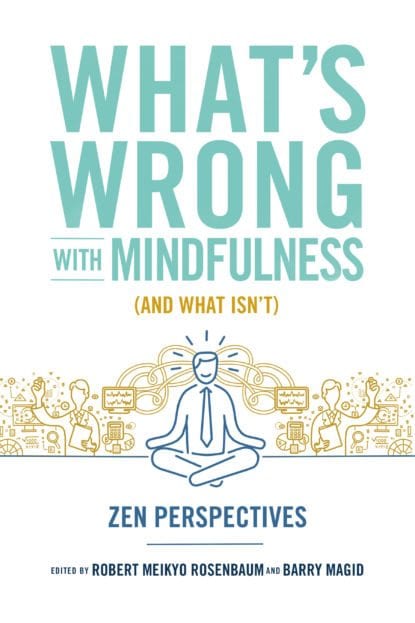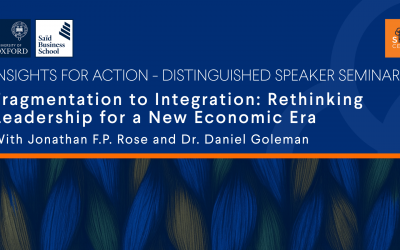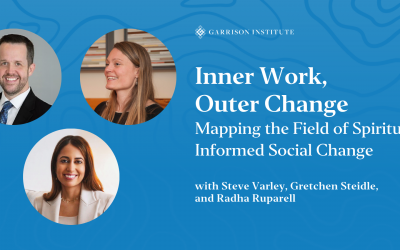We’re often told that mindfulness will benefit us by reducing stress and increasing focus and productivity, among other things. But what if our desire to obtain these benefits gets in the way of our discovering the deeper and more radical possibilities that the practice might reveal? In a new book, What’s Wrong With Mindfulness (And What Isn’t), Robert Rosenbaum and Barry Magid have collected a series of essays that explore the current mindfulness trend from Zen perspectives.
We recently had an email exchange with Rosenbaum and Magid to discuss some of the book’s major themes.
In What’s Wrong With Mindfulness (And What Isn’t), you emphasize “no gain.” Are you saying that mindfulness practice will not lead to benefits like self-control, stress-reduction, increased concentration, and so on?
Robert Rosenbaum: It’s not that mindfulness won’t lead to benefits, but rather that the more concerned we are about obtaining benefits the more we get in the way of receiving them. It’s a little like going to sleep or falling in love—working hard to make it happen interferes with the process.
Concentrating on “getting something” constrains possibilities to what you are currently able to conceive, rather than opening up to visions you can’t currently even imagine. It’s the difference between grasping at some thing and cultivating an empty field.
 You write about the secularization of mindfulness, meaning it’s been taken out of its monastic context. What exactly is lost when spiritual practices are secularized?
You write about the secularization of mindfulness, meaning it’s been taken out of its monastic context. What exactly is lost when spiritual practices are secularized?
Robert Rosenbaum: If “secular” only meant taking practices out of monastic settings and into everyday life, I’d have no problem with it. But “secular” takes on the colors of the culture at hand. In our society, this tends to be pragmatic, individualistic, materialistic, self-centered, competitive, goal-oriented, and commercial. In the West, capitalism intrudes on every area of life, making even spiritual practices commodities. Once you treat anything as a commodity and source of profit, you change it.
On a practical level, making meditative practices secular might seem to make them “value-neutral,” and thus more acceptable to medical centers and corporations seeking to utilize them for specific ends. But in reality, they take on the values of the culture at hand.
Barry Magid: Spiritual practice is the antithesis of the “means to an end” thinking that characterizes our usual secular point of view. The radical benefit of meditation as a spiritual practice is that is offers a way to step off the treadmill of asking questions like How am I doing? Am I there yet? Am I getting better or worse? It is an alternative to a world in which everything is a technique that can be done well or badly.
Mindfulness, taken out of its religious or spiritual context, brings meditation right back into that usual world of problems and solutions, progress, improvement, and techniques. Used as a technique, mindfulness in its various guises can indeed be useful for things like stress and increasing productivity. But to “use” meditation as a means to an end is to completely lose sight of what is unique about spiritual practice. “No gain” is a short hand for speaking of the opposite of “using” meditation for any purpose and seeing it precisely as the alternative to that way of thinking.
Can you talk about the tension between accepting things as they are and wanting to improve things?
Robert Rosenbaum: There is no real tension here. Suzuki Roshi once said, “You are perfect the way you are and you could use a little improvement.” This is the way things are: the relative and absolute are two sides of the same coin. True freedom involves leaping beyond both while staying within each.
Barry Magid: In Zen, “spiritual” means the experience of the absolute as inherent in everyday life. This means that the everyday has absolute value and meaning in and of itself. Things and people, just as they are, have an inherent value and perfection and are not imperfect versions of something else. We are not engaged in an endless project of refinement, purification, or self-improvement. We are simply trying to become aware of things as they already are.
On the whole, do you think the proliferation of mindfulness is a positive or negative development?
Robert Rosenbaum: To think in terms of positive and negative is to polarize. I have no doubt that the spread of mindfulness in our society has benefitted many people. But to use meditation just for relaxation and stress management—to use it as simply a tool—doesn’t allow you to realize its full potential. I’m concerned that watering it down will diminish its true transformative possibilities and that making it into a technique can limit it to how “useful” it is. This rather misses the point and also sets it up for potentially being disappointing, when it doesn’t “work” as expected.



